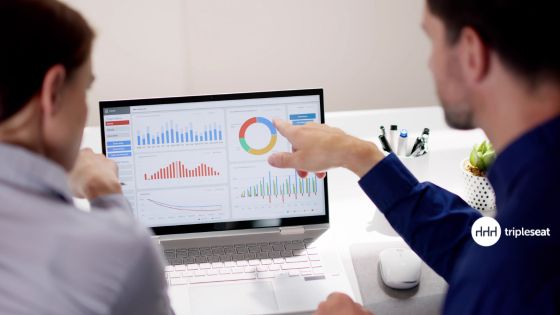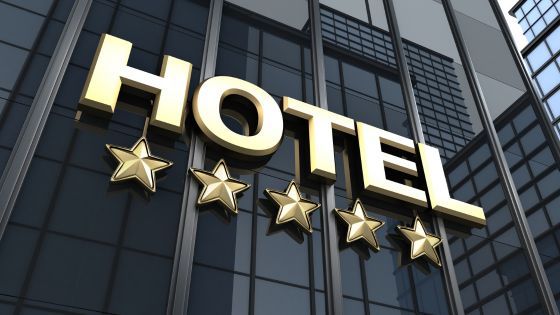The Hotel KPIs You Need to Track: A Guide to Data-Driven Success

In today’s competitive hospitality landscape, running a successful hotel is more than just providing a comfortable bed and a friendly smile. It’s about making smarter, faster, and more strategic decisions. To do that, you need to speak the language of data, and that language is built on Key Performance Indicators (KPIs).
These measurable metrics are your hotel’s pulse, enabling you to track performance, evaluate profitability, and fine-tune your operations in real-time. This guide will break down the most important KPIs in the hotel industry, explain how they’re calculated, and show you how to leverage them to elevate every aspect of your business—from financial health and guest satisfaction to marketing effectiveness and group revenue growth.
Key Takeaways (TL;DR)
Technology is Your Ally: Modern tools can streamline data collection and management, particularly in complex areas such as group sales.
KPIs are essential: They provide the data you need to make informed decisions and stay competitive.
The “Big Three”: Occupancy Rate, Average Daily Rate (ADR), and Revenue Per Available Room (RevPAR) are the foundational metrics of hotel revenue management.
Look Beyond the Basics: KPIs like Gross Operating Profit Per Available Room (GOPPAR), Customer Satisfaction Score (CSAT), and Direct Booking Ratio offer a more holistic view of your hotel’s health.
Action is Key: Tracking KPIs is only half the battle. You need to use the insights to make strategic improvements.
What is the Meaning of KPI? What are Hotel KPIs?
KPIs, or Key Performance Indicators, are specific data metrics used to measure and evaluate the performance and success of a hotel business. These indicators help hotel managers and owners track progress, identify areas for improvement, and make data-driven decisions. They are quantifiable measurements that assess critical aspects of hotel operations, such as financial performance, guest satisfaction, operational efficiency, and market position.
The Foundational Three: Occupancy, ADR, and RevPAR
Start with these three interconnected KPIs that form the foundation of hotel revenue management. They tell a story about your hotel’s performance, and understanding their relationship is crucial.
1. Occupancy Rate
- What it measures: The percentage of available rooms that are occupied over a specific period.
- Formula: (Occupied Rooms / Total Available Rooms) x 100
- Why it matters: This is the most straightforward measure of demand. A low occupancy rate might point to issues with your pricing, marketing, or even your online reputation. A high rate indicates healthy demand.
- Departmental Focus: Primarily Sales, Marketing, and Revenue Management.
Real-World Scenario: Imagine a 100-room hotel that sold 85 rooms last night. Its Occupancy Rate was 85%. If a competing hotel of the same size only sold 70 rooms, you can instantly see who was more successful at filling their property.
How to Improve This KPI:
- Dynamic Pricing: Adjust your rates based on seasonality, local events, and competitor pricing.
- Targeted Promotions: Offer packages or last-minute deals during slow periods to attract more guests.
- Positive Reviews: Encourage happy guests to leave reviews on platforms like TripAdvisor and Google to boost your online appeal.
2. Average Daily Rate (ADR)
- What it measures: The average revenue earned for each occupied room.
- Formula: Total Room Revenue / Number of Rooms Sold
- Why it matters: ADR reflects your hotel’s pricing power. A higher ADR indicates that you’re attracting guests who are willing to pay more for the value you provide.
- Departmental Focus: Primarily Revenue Management and the Front Office.
Real-World Scenario: If your hotel generated $15,000 in room revenue from the 85 rooms sold, your ADR would be $176.47 ($15,000 / 85). This tells you the average price guests paid for a room.
How to Improve This KPI:
- Upsell and Cross-sell: Train your front desk staff to offer room upgrades or add-on packages (e.g., breakfast, spa treatments).
- Create Premium Packages: Bundle rooms with unique experiences like local tours, dining credits, or event tickets to justify a higher price point.
- Focus on Value: Emphasize what makes your hotel unique—be it exceptional service, prime location, or special amenities—to command a higher rate.
3. Revenue Per Available Room (RevPAR)
- What it measures: A combination of occupancy and ADR, this is arguably the most important top-line metric. It shows how well you’re balancing filling rooms and maximizing rates.
- Formula: Occupancy Rate x ADR
- Why it matters: RevPAR gives you a comprehensive view of your hotel’s revenue-generating performance. A high ADR is great, but not if your occupancy is suffering. The goal is to find the optimal balance where both ADR and occupancy are optimized, resulting in the highest possible RevPAR.
- Departmental Focus: A key metric for General Managers, Revenue Management, and Sales.
Real-World Scenario: Using the numbers from our 100-room hotel: 85% Occupancy x $176.47 ADR = a RevPAR of $150. This means the hotel earned, on average, $150 for every single one of its rooms, whether they were sold or not.
How to Improve This KPI:
- Length of Stay Restrictions: During high-demand periods, implement a minimum length of stay to maximize revenue from each booking.
- Group Sales Strategy: Attracting group bookings for conferences or events can significantly boost RevPAR, especially during shoulder seasons. Managing this effectively is key. This is where a platform like Tripleseat for Hotels can be a game-changer, helping you streamline group inquiries, manage room blocks, and track revenue seamlessly.
Expanding Beyond the Basics: A Holistic View of Hotel Health
To truly understand your hotel’s performance, you need to look beyond just room revenue.
4. Gross Operating Profit Per Available Room (GOPPAR)
- What it measures: Your hotel’s total revenue from all sources (rooms, F&B, spa, events) minus operating expenses, divided by the number of available rooms.
- Why it matters: GOPPAR gives you a bottom-line look at your hotel’s true profitability. It shows how efficiently you’re managing costs across all departments.
- Departmental Focus: Crucial for General Managers, Finance, and Department Heads.
How to Improve This KPI:
- Control Costs: Regularly review and optimize operational costs, from labor and utilities to inventory management in your restaurant.
- Boost Ancillary Revenue: Promote your other revenue streams, like your restaurant, bar, or meeting spaces, to both guests and non-guests.
5. Customer Satisfaction Score (CSAT)

- What it measures: Guest satisfaction, typically through post-stay surveys, online reviews, and direct feedback.
- Why it matters: Happy guests become repeat customers and brand ambassadors. A high CSAT score drives loyalty, positive word-of-mouth, and a strong online reputation.
- Departmental Focus: This is an all-hands-on-deck metric, from Housekeeping and the Front Office to F&B.
How to Improve This KPI:
- Act on Feedback: Don’t just collect feedback—act on it. If multiple guests mention slow check-in, address the process.
- Empower Your Staff: Give your team the autonomy to solve guest problems on the spot. A small, quick gesture can turn a negative experience into a positive one.
6. Direct Booking Ratio
- What it measures: The percentage of bookings made directly through your hotel’s website or reservation system versus through third-party channels and Online Travel Agencies (OTAs).
- Why it matters: Direct bookings are almost always more profitable because you avoid paying high commission fees to OTAs.
- Departmental Focus: Marketing and Revenue Management.
How to Improve This KPI:
- Offer Incentives: Provide a clear reason for guests to book direct, such as a “best rate guarantee,” a complimentary room upgrade, or a free drink voucher.
- Optimize Your Website: Ensure your website is user-friendly, mobile-responsive, and has a simple, secure booking engine.
The Importance of Benchmarking
Tracking your KPIs is great, but the numbers are most powerful when you have context. This is where benchmarking comes in. You should regularly compare your hotel’s performance against:
- Your historical performance: Are you doing better this month than the same month last year?
- Your competitive set (“comp set”): How do you stack up against a curated group of your direct competitors?
- The wider market: What are the overall trends in your city or region?
Services like STR reports provide detailed benchmarking data that can help you understand if your pricing and marketing strategies are effective or if you’re being outpaced by the competition.
Bringing It All Together with the Right Tools
When you understand and track the right KPIs, you gain the clarity and control needed to make strategic decisions, improve operations, and elevate the guest experience.
However, tracking data—especially for complex revenue streams like group sales and events—can be overwhelming. This is where technology becomes essential. For instance, managing group bookings, event inquiries, and catering details on spreadsheets is inefficient and prone to error.
Tripleseat for Hotels is designed to solve this problem. Our platform streamlines your entire event management process, from initial inquiry to final billing. By optimizing your group sales and event operations, Tripleseat empowers your hotel to:
- Efficiently manage group bookings to maximize room block revenue.
- Gain deep insights into segment profitability, allowing you to focus on the most lucrative business.
- Save time and reduce manual work for your sales team, allowing them to focus on what they do best: selling.
Ready to take your group business to the next level?
Download our free guide, “How to Grow Your Sales and Catering Leads” and see how Tripleseat for Hotels can help you simplify event operations, increase bookings, and drive profitability. Or book a time to get a personalized demo!
